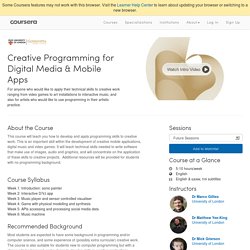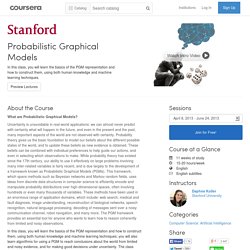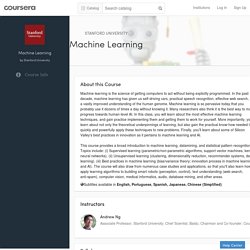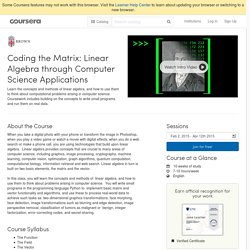

Creative Programming for Digital Media & Mobile Apps. About the Course This course will teach you how to develop and apply programming skills to creative work.

This is an important skill within the development of creative mobile applications, digital music and video games. It will teach technical skills needed to write software that make use of images, audio and graphics, and will concentrate on the application of these skills to creative projects. Additional resources will be provided for students with no programming background. Course Syllabus Week 1: Introduction: sonic painter Week 2: Interactive D/VJ app Week 3: Music player and sensor controlled visualiser Week 4: Game with physical modelling and synthesis Week 5: APIs accessing and processing social media data Week 6: Music machine Recommended Background Most students are expected to have some background in programming and/or computer science, and some experience of (possibly extra curricular) creative work.
Suggested Readings There is no required reading. Probabilistic Graphical Models. About the Course What are Probabilistic Graphical Models?

Uncertainty is unavoidable in real-world applications: we can almost never predict with certainty what will happen in the future, and even in the present and the past, many important aspects of the world are not observed with certainty. Probability theory gives us the basic foundation to model our beliefs about the different possible states of the world, and to update these beliefs as new evidence is obtained. These beliefs can be combined with individual preferences to help guide our actions, and even in selecting which observations to make. While probability theory has existed since the 17th century, our ability to use it effectively on large problems involving many inter-related variables is fairly recent, and is due largely to the development of a framework known as Probabilistic Graphical Models (PGMs).
Course Syllabus Topics covered include: Introduction and Overview. Coursera.org. Machine learning is the science of getting computers to act without being explicitly programmed.

In the past decade, machine learning has given us self-driving cars, practical speech recognition, effective web search, and a vastly improved understanding of the human genome. Machine learning is so pervasive today that you probably use it dozens of times a day without knowing it. Many researchers also think it is the best way to make progress towards human-level AI. In this class, you will learn about the most effective machine learning techniques, and gain practice implementing them and getting them to work for yourself.
More importantly, you'll learn about not only the theoretical underpinnings of learning, but also gain the practical know-how needed to quickly and powerfully apply these techniques to new problems. This course provides a broad introduction to machine learning, datamining, and statistical pattern recognition. Web Intelligence and Big Data. An Introduction to Interactive Programming in Python. Introduction to Data Science. Coding the Matrix: Linear Algebra through Computer Science Applications. About the Course When you take a digital photo with your phone or transform the image in Photoshop, when you play a video game or watch a movie with digital effects, when you do a web search or make a phone call, you are using technologies that build upon linear algebra.

Linear algebra provides concepts that are crucial to many areas of computer science, including graphics, image processing, cryptography, machine learning, computer vision, optimization, graph algorithms, quantum computation, computational biology, information retrieval and web search. Linear algebra in turn is built on two basic elements, the matrix and the vector. In this class, you will learn the concepts and methods of linear algebra, and how to use them to think about problems arising in computer science. Recommended Background You should be an experienced programmer. You are not expected to have any background in linear algebra. Suggested Readings Coding the Matrix is an optional companion textbook.